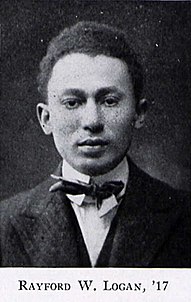Every day this month, the Center for Black Educator Development, in partnership with Phillys7thWard.org and Citizen Ed, will highlight a Black Educator Hall of Famer. But, don’t forget, e’ry month is Black History Month…February is just the Blackest.
Today, our featured Black Educator is Rayford Whittingham Logan.
Rayford W. Logan was born on January 7, 1897 in Washington D.C. and grew to become an educator and one of the leading Black historians of the twentieth century with the support of two giants of Black intelligentsia, Drs. W.E.B. DuBois and Carter G. Woodson—Woodson discovered Logan, who was his student at the famed Dunbar High School.
Dr. Logan graduated from Dunbar and attended Williams College on scholarship. He would eventually graduate from Harvard with his Masters (1932) and doctorate (1936) degrees.
Upon graduation from Williams College, Dr. Logan’s joined the U.S. Army and served in WWI. After the war, he remained in France for a time and assisted Dr. DuBois with coordinating the second Pan African Conference in Paris. It was in Paris where Dr. Logan was encouraged to take up the mantle of Black history.
His first teaching assignment came upon his return to the United States at Virginia Union University. However, Dr. Logan was forced to resign years later due to his clashes with white philanthropic board members because of activist activity on behalf of Black people, which included registering Black people to vote. Logan was eventually hired by Howard University where he served as a historian from 1938 to 1965, and the professor emeritus until 1982, the year of his death.

What makes Dr. Logan such a powerful educator was his devotion to Black history, activism and educational justice, and his teaching of Black history through his powerful pen.
A prolific scholarly writer, Dr. Logan published numerous works including The Negro in American Life and Thought: The Nadir, 1877–1901(1954), The Diplomatic Relations of the United States with Haiti, 1776-1891 (1941), The Betrayal of the Negro (1954) and Haiti and the Dominican Republic (1968).
Dr. Logan’s body of work is an example of Dr. Greg Carr’s call to retain Black institutional memory. There’s much “new” scholarship published on these subjects; however, the momentum of institutional memory would cause us to look back to the works of the likes of Dr. Logan to gather understanding of the African Diaspora.
As a respected scholar, Dr. Logan drafted President Franklin Roosevelt’s executive order that prohibited Blacks from serving in the military during WWII as a member of Roosevelt’s Black Cabinet. Dr. Logan also served briefly as director of the Association for the Study of Negro Life and History the year of Dr. Woodson’s death and also served as the 15th general president of Alpha Phi Alpha.
Dr. Rayford Logan; a member of the Black Educator Hall of Fame.
For more information on Rayford W. Logan, visit the following site.

